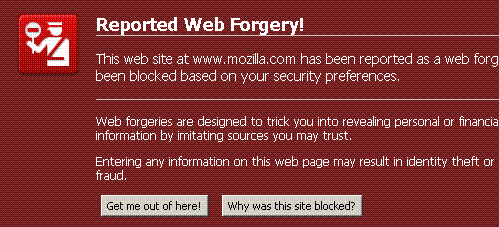Online Threats: Phishing
The online threat antiphishing filter aim to deter is what we called as "phishing".
Phishing originates from the word 'fishing', which in the computering field, is used to describe a situation when someone tries to acquire your sensitive information by posing as a legitimate entity in an online communication. Phishing can be regarded as fraudulent online criminal act, and its main element of threat is via deception/fraud. This kind of online threats are mostly prevalent on instant messaging software, e-mail services, auction sites (such as eBay) & social networking sites such as Myspace, therefore making it a tricky job for users not to get "phished".
 Statistics on countries which had the most host in phish websites. US seems to have alot of guys who phish....
Statistics on countries which had the most host in phish websites. US seems to have alot of guys who phish....If you had read my previous entries on spywares and adware, you'll notice that phishing, from a certain point of view, is quite similar. However, what differentiates identity-extracting spywares & adwares from phishing is that phishing only threatens users who are using the internet at the time of present. As for antispywares, they can only find & send your sensitive information back to its creator when they successfully infiltrated your PC (which can be avoided for most of the time if you own a decent antispyware protection).
These are the phishing techniques that i want to share with you:
- Link Manipulation (fake link which directs you to a phishing website rather than the webpage you intend to go)
- Filter Evasion (the use of images instead of text to avoid traditional antiphishing detection)
- Website Forgery (fake webpage designed based on a legitimate website)
- Phone Phishing [Phishing via voice-over internet protocol (VoIP)]
 Typical example of a warning from the Mozilla Firefox browser on a phish website
Typical example of a warning from the Mozilla Firefox browser on a phish websiteIf you think phishing is not as dangerous as it sounds, think again. Imagined that you have been "phished" by an online criminal. The criminal had information of your credit number at a certain bank, username and password of a certain site and even your mother's surname. He/she can do whatever they want with the information: Change the username & password and deny you of your priviledge of accessing into your own social site, create fake accounts with your name, use up all your bank credit via online purchases and even expose your personal identity worldwide!
 Illustration of how a phisher hoax users via link manipulation & website forgery
Illustration of how a phisher hoax users via link manipulation & website forgeryPersonally, i once had a girl telling me that phishing is a pointless security issue- a very wrong concept for a computer user, especially as when she is involved in online purchases to a certain degree. It's true that this online threat can be evaded as long as you have updates to your antiphishing software/security software, but remember: even the best security software takes time to update on certain threats; sometimes it even took months for security vendors to discover a long existing phishing threat and issue an update.
My advice to you all who care: Be constantly vigilant while browsing the internet!

0 opinion:
Post a Comment